An interview and jam with the experimental theory band.
We Are Not Sick
Jess Henderson speaks to media theorist and net critic Geert Lovink about his experimental music/theory project ‘We Are Not Sick.’ The interview discusses the contemporary internet-psyche, why digital detoxes and other individual prescriptions are not solutions but rather part of the problem, and where the Bartlebian “I’d prefer not to” attitude might come in.
As part of its research on burnout, the Band of Burnouts lab presented experimental theory band We Are Not Sick at Zurich’s annual contemporary music festival Lange Nacht 2021. The collaboration entailed a live evening at Mehrspur Music Club in Zurich, with a limited edition zine available for visitors onsite.
Inside the zine is an interview with founding member of the band, media theorist and net critic Geert Lovink, We Are Not Sick stickers, a take-home poster from the event, info on remixing the album yourself, and a micro-publication of the lyrics from the band’s debut album Sad by Design.
Here is the interview, now available for the SoC publication with an intro into the music itself.
Sad by Design
The album begins with a moody hum that soon fills the body with a familiar feeling. As the voiceover iterates that “Intuitively, many feel that their mental mess is produced by society. It is not a sickness in our heads”, we know that this is a kindred spirit speaking to us from the void. Since first hearing some rough Sunday-jam tracks of what would become the Sad by Design album, I have been a fan of We Are Not Sick’s new modality of critical theory. The beat-driven aphorisms, dancefloor-worthy treatises, and witty delivery of the relatable everyday internet-psyche experience, are a welcome re-think of contemporary theorisation. Listening to an album is sure as hell more fun than reading another academia.edu article.
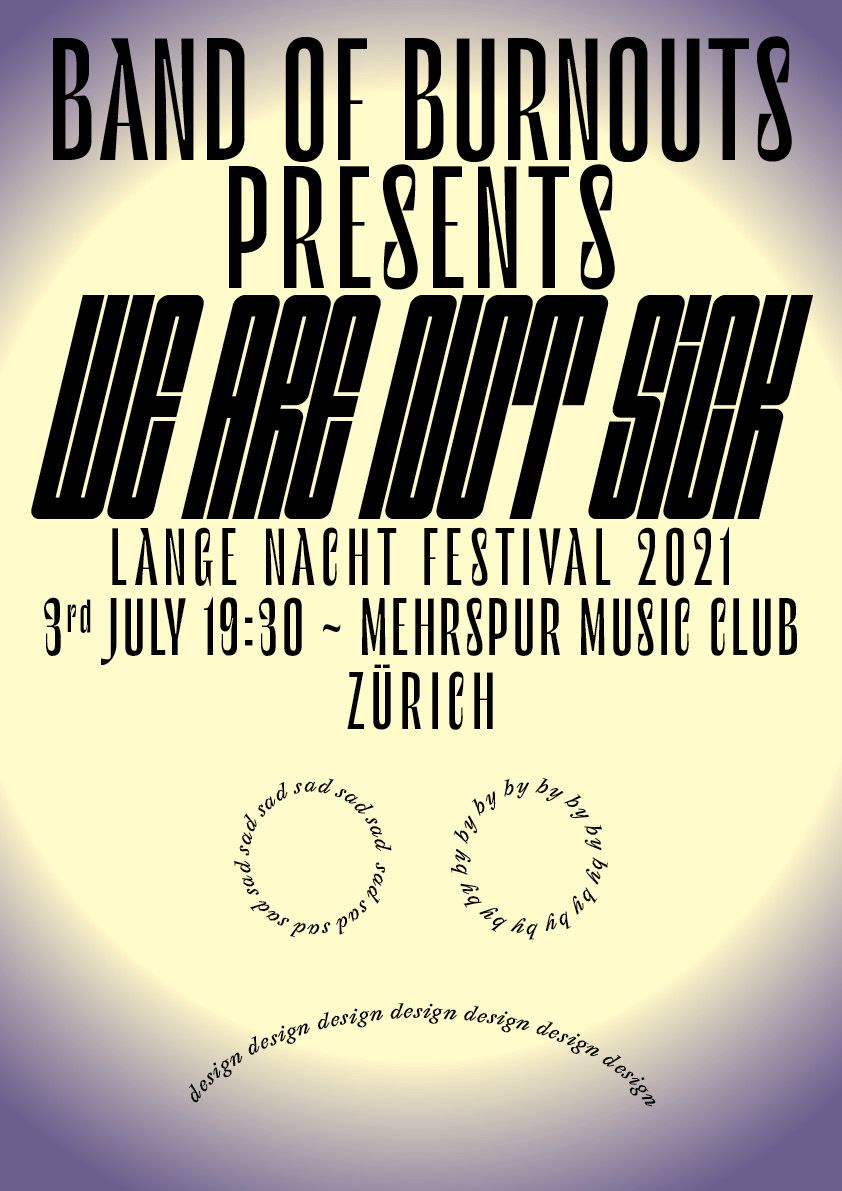
Event poster. Design by Jess Henderson
For the 2021 edition of the Lange Nacht Festival (Long Night) in Zurich, our Band of Burnouts research lab got together with We Are Not Sick as part of our year-long series of interventions around the topic of the burnout. Band of Burnouts is a transdisciplinary study of the burnout phenomenon through multi-voiced, multi-perspective, encounters with the experience. Within our research the subject of social media appears again and again. Feelings towards using social platforms in relation to burnout range from overwhelm and aversion, to consolation, ambivalence, and total resentment. The full spectrum is there. What is unique about We Are Not Sick’s standpoint is the refusal to accept that the fact that the majority of people report having negative feelings after a session on social media (primarily sadness, loneliness, and low self-worth) means there is something wrong with them. We are not sick, the platforms are. As the first track on the album states:
“We can no longer leave the management of the world to Silicon Valley. We need to dismantle the free and invent new ways to work together and deal with differences and disputes, rather than rehashing them for the billionth time.”
To listen to this EP is to melt into John Longwalker’s genre-defying sounds; from gentle ambience to raw– almost brutal–hip hop and anthemic acid house, whilst Geert Lovink speaks truth to the platform and the contemporary condition. First off though, an interview with one-half of the We Are Not Sick duo, Geert Lovink.
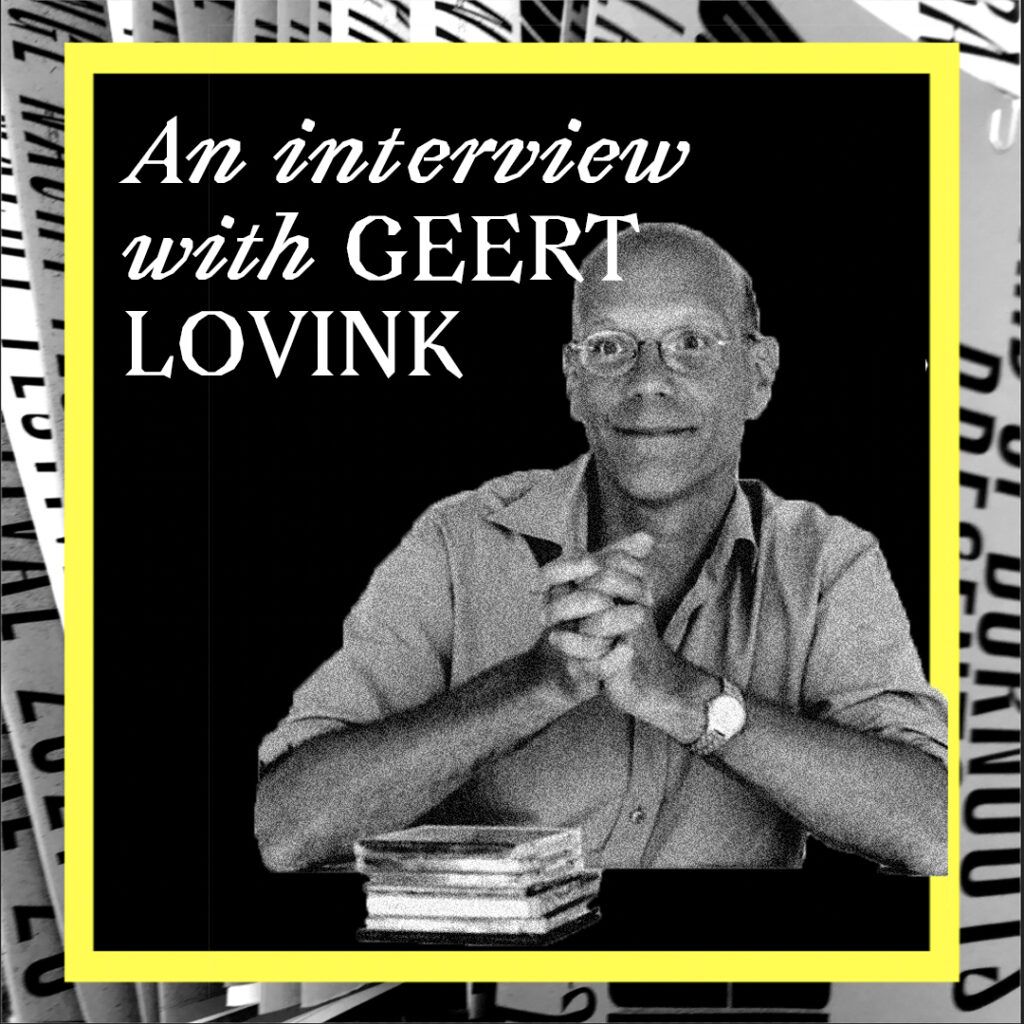
Jess Henderson: The band name We Are Not Sick is a clear statement. What is it a refusal of?
Geert Lovink: Stating that we are not sick is a refusal to see our smartphone and social media ‘addictions’ as own individual problems that can be ‘healed’ by corrective apps—designed by the same platforms that created the manipulative interfaces in the first place.
We should not feel guilty and internalize these problems. A digital detox weekend is not the solution. It might feel good to delete the Facebook, Instagram, and/or WhatsApp logos from your phone to install Telegram and Signal instead, but this should not be our aim.
Now, individual solutions like this are part of the problem. They defer from the urgency to come together, organize, strike, refuse, and bring the internet (in this case) to a hold. Platform monopolies should be dismantled not ‘regulated’. It is that simple. How do we get there? By realizing that it is not our mental mess that is at the centre of the universe, even though it feels that way. Collectively, we need to get out of the catch-22 situation that neoliberalism created for us: where the individual, confronted with the poverty of its techno-subjectivity, has to be both the starting point and the ultimate goal of every intervention that we (can) imagine.
Indeed, it is a catch-22. It’s also nothing new to take pleasure in something we are told is “bad for us.” I’m thinking about the rhetorics around ‘health’ vs. ‘sickness’, and how these things can be utilised for societal warfare—as Barbara Ehrenreich writes on the war on smoking:
- ‘As more affluent people gave up the habit, the war on smoking, which was always presented as an entirely benevolent effort, began to look like a war on the working class…
- Workers at work like smoking breaks. Why do they like smoking breaks? Because the rest of the time they’re running around stocking shelves, doing what they’re told, serving meals. When you smoke, that’s a working-class kind of self-care. You could say, “Well, it’s nonsense. It’s a bad thing to do,” but that’s when you have nothing else. It can calm you very quickly.’¹
Now it is said that ‘social media is the new smoking.’ Presumably, this means it is bad for our health. What are the problems with this analogy, and how does We Are Not Sick, the band, conceive of the notions of ‘health’ vs. ‘sickness’?
GL: Most French philosophers in the ‘postmodern’ category smoked and some of them even died of lung cancer. For them, Hannah Arendt for instance, and many others of that generation, the “pleasure of the text” was indeed intimately related to smoking. Like smoking, we are now seeing a new generation take the stage for whom both reading and writing is closely tied to social media and their smartphones. Sure, likes and nicotine have certain similarities. I’d leave it up to the dissident neuroscientists and behavioural psychologists to explain the scientific details here. Please re-read Sadie Plant’s Writing on Drugs (1999). We all have our own preferences and pleasures, neurotic impulses and bad behaviours. I personally love to delegate smoking and social media to others: please do it for me. I miss it, yet I can’t do it. I have a Bartlebian “I’d prefer not to” attitude here, which I despise to promote.
The title of the band’s debut album is Sad by Design. Can you explain some of the critical thought and main themes that lie within the songs?
GL: There are similarities between this album and my first album with our Bilwet/Adikno collective called Electronic Solitude or Elektronische Einsamkeit that came out at the height of the dotcom boom in 1999, where I read aloud texts in German and English.
This time my collaboration with John Longwalker in We Are Not Sick resulted in the ‘Sad by Design’ album that was produced in the pre-Covid 2018-19 years—which had a similar frantic, pre-apocalyptic ‘roaring twenties’ feel.
As we know from previous epochs, the intense and depressed psycho-states of artists and other irregulars preempts the actual outbreak of the crisis, whether it is late 1929, mid-2000, or early 2020. In this case, it is all about social media anxiety. The waiting, the anticipation, the silence of the Other in an age of real-time exchanges. What does it mean when your ranking is low whilst you are, virtually, surrounded by influencers and other TikTok dancers? What is the long-term implication of the absence of undergrounds and subcultures, when literally all cultural expressions are commodified and set in gentrified urban environments? What is the impact of the real existing nihilism caused by state and platform surveillance?
In my most recent work I focused on techno-sadness as a possible result, although we all know there are a whole range of expressions—from loneliness and anger, to depression and anxiety. Collective anxiety outbursts are real. Shitstorms are real. So is bullying and revenge porn, as is cyber warfare, ransomware, pump ‘n’ dump schemes, fake news, and other yet-unknown forms of cyber manipulation. When we add all of this up, it is not hard to understand the mass disillusion and inability to act collectively to overcome the ‘stack of crises’ that the world is facing.
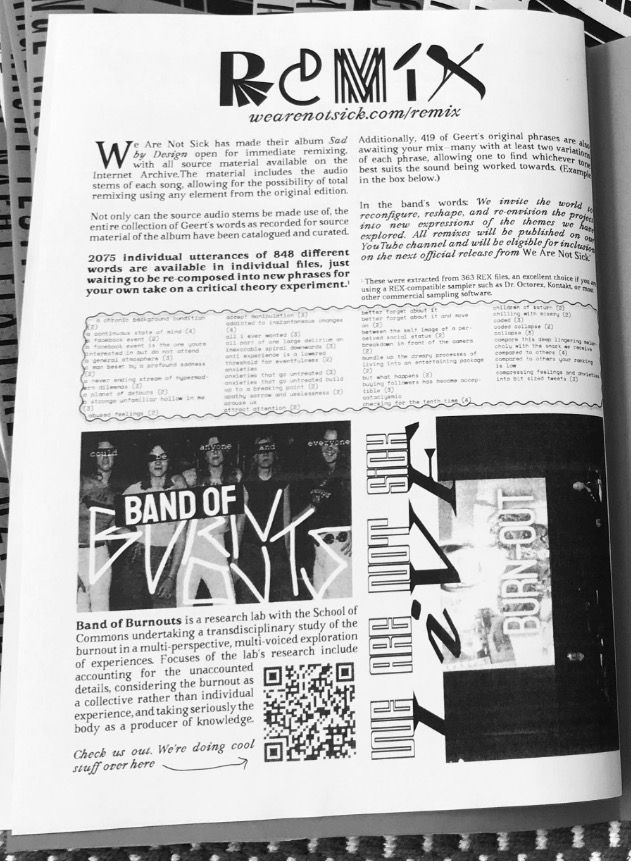
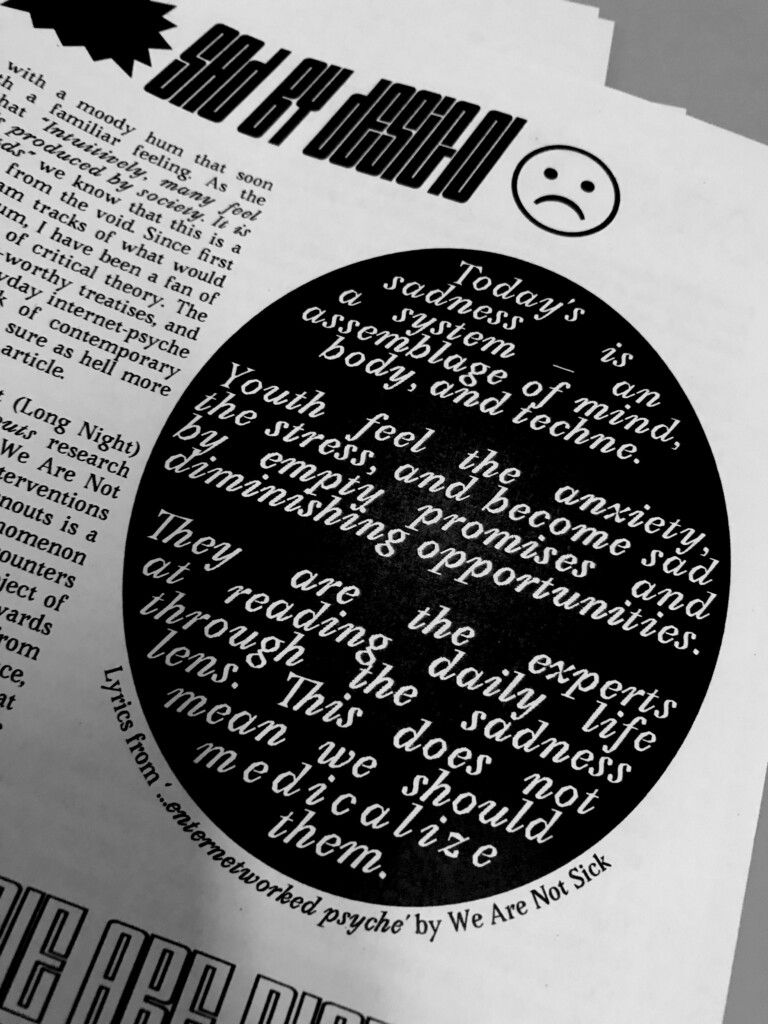
The band has made the whole album openly available for remix and you and John have said that you “want to provide the entire world with the opportunity to remix our album.” All the tracks, as well as hundreds of lines of text and thousands of individual words, are available and completely configurable to any interpretation. What was the motivation to put the album up for free remix and what would be your dream to see done with it?
GL: This idea grew out of John’s push controller for Ableton Live, an instrument where you pre-program buttons that light up. They are played like a square keyboard. For each button, you can allocate either a sample or a phrase, a slogan or a word, and thus one can recombine certain moods and phrases into a song, as well as scratch and repeat them whilst doing the same with the underlying music. In my 1980s world, this would be a reference to Laurie Anderson and William Burroughs, although there might be multiple musical theory performances that one could refer to that have used similar techniques in the past. The idea here would be to dance to the theory, which, in the case of rap, has been proven possible. The body no longer needs to be disciplined, sit still, and silently take in the complexity of the carefully crafted sentences that are packed with concepts and references, as is the case in reading a static text. Instead, theory tracks into meme-mode and acknowledges the contradictory, fragmented ways of life that we live.
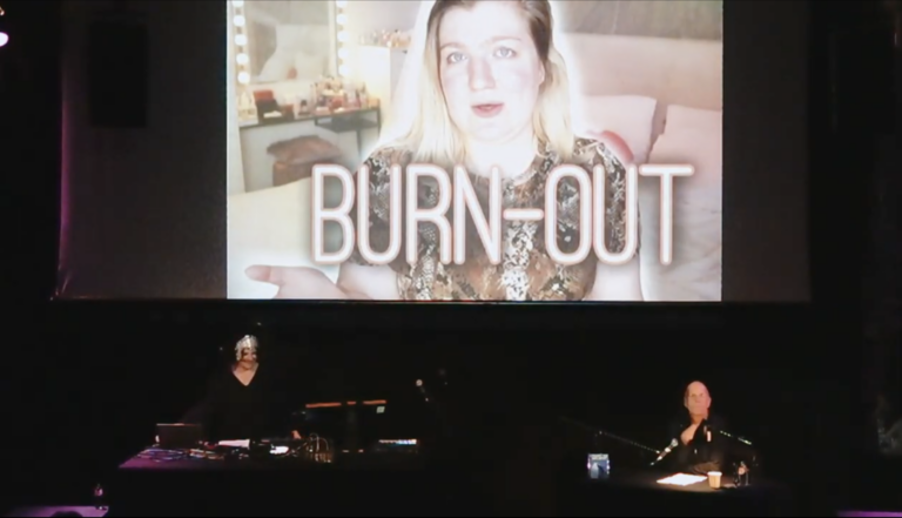
We Are Not Sick live (left to right: John Longwalker, Geert Lovink)
How do you see the relation between the “encroaching sadness provoked by social media architectures” that We Are Not Sick addresses and the phenomenon of burnout?
GL: The boundaries are blurry, I know, but we refrain from saying that everyone is suffering from depression, that everyone is sick, needs to see a doctor, receive medication, take time off to heal, etc. While I wish everyone could take time off to have a break and recover, I strongly believe in organization, uprisings and revolts, and fundamental change. I do not believe in the medicalization of everything.
We need other media architectures, other social networks, more relaxed ways to communicate, and not this hyperbolic pressure to stay available 24/7. Burnout is a serious condition that acts like a ‘sickness container’ in which a multitude of symptoms are blended into one very heavy feeling of no longer being to continue, a psycho-somatic breakdown that I won’t go into full detail over. I am most interested in its weaker variations that are sensed by billions in micro-doses, daily. As an internet critic, media theorist, and activist, what I can do is get a better understanding of the designed dialectics of extraction on the one hand, and exhaustion on the other. For some this leads to burnout, for others it leads to but a mere, mild form of resignation. In the end, precisely how the platform economy plays out should not bother us. What matters is how we respond, how we care, and how we organize.
Footnotes
I Have to Ask: Deep conversations with Isaac Chotiner. “Barbara Ehrenreich.” Podcast audio. April 28, 2013.
In his short essay "This Happiness is making me suffer", Mirko Zardini correlates the ideals of emotional capitalism and the individuality of the neoliberal economic model. He states that the happiness and well-being industry asks us to relinquish our claim to transform the world around us, insisting instead that we transform ourselves, adapting to new moral and behavioural imperatives.
As a counteraction, how do you think processes/groups like the Band of Burnouts could promote commoning practices focused on the WE and the ACTIONS that these collective bands could embrace. In other words, what could be the next step to improve commonality, critical thinking and action to foster the TRANSFORMATION of the world around us that Zardini mentioned?
This Happiness is making me suffer (Mirko Zardini)
Our Happy Life: Architecture and Well-Being in the Age of Emotional Capitalism.
Coming together, hanging out, figuring it out – these simple practices (which are really just ways we live our lives) are felt as a counteraction to what you describe. These social happenings, convos, walks, coffees and cigarettes, were the best times had in this lab. I believe small orientations like this are transformational.
Jess Henderson
Jess is a transdisciplinary writer, researcher, and artist from New Zealand.